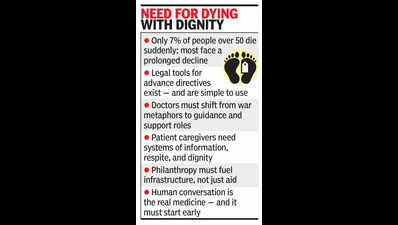Business
Experts Urge Honest Conversations About Death at Festival in Bengaluru

The inaugural “Good.To.Go Death Literacy Festival” held in Bengaluru focused on the importance of open discussions about death among families. Organized by Pallium India and the Vidhi Centre for Legal Policy, the event featured experts emphasizing the need for honesty, legal tools, and effective palliative care in preparing for end-of-life scenarios.
During the session titled “What does dying in India look like — and what needs to change?”, medical professionals highlighted the common trajectories of dying and advocated for clear communication about end-of-life planning. Dr. Roop Gursahani, a neurologist at PD Hinduja Hospital in Mumbai, shared insights about the three primary paths of dying: the rapid decline associated with cancer, the cyclical nature of organ failure, and the slow progression of dementia. “Only 7% of people over 50 die suddenly,” he noted. “The majority will experience a prolonged decline, and families need to prepare for that reality.”
The festival also showcased the personal experiences of caregivers. Actor and caregiver Darius Sunawala recounted his journey, underscoring the emotional weight of silence surrounding death. “If you think the conversation is difficult now, it will be impossible later,” he remarked, contrasting his father’s openness about death with the silence of his father-in-law, which he described as a source of pain.
On the legal front, Hardik Dua, a senior resident fellow at the Vidhi Centre, discussed the significance of Advance Medical Directives (AMDs). He explained how the Supreme Court’s 2018 ruling legitimized these directives, with further simplifications made in 2023, enhancing accessibility for end-of-life choices. “Any sheet of paper will do—write down your care goals, talk to your family, appoint a representative,” Dua advised. He emphasized that while the law provides a framework, action and awareness are essential for true progress.
The conversation also highlighted the systemic changes needed in palliative care. Sweety Thomas, representing the Ajit Isaac Foundation, called for end-of-life care to be recognized as a public health right rather than an act of charity. “This is about systemic change and building research-backed multidisciplinary centers,” she stated. The response to the festival on social media, according to Thomas, indicated a growing readiness for these conversations among a diverse audience.
Finally, Dr. Rajani Bhat, a pulmonologist and palliative care physician at Sparsh Hospital in Bengaluru, spoke to the necessity of extending care beyond hospital walls. She recalled a poignant moment when a renowned rural doctor with advanced heart failure expressed concern about not receiving care at home. “That’s what palliative care does—it brings care home when hospitals can’t heal,” Bhat explained.
The discussions at the festival reflect a significant cultural shift towards acknowledging and addressing the realities of death and dying in India. As experts and caregivers alike advocate for more open conversations, the hope is that families will be better equipped to navigate these challenging yet inevitable experiences.
-

 World5 months ago
World5 months agoSBI Announces QIP Floor Price at ₹811.05 Per Share
-

 Lifestyle5 months ago
Lifestyle5 months agoCept Unveils ₹3.1 Crore Urban Mobility Plan for Sustainable Growth
-

 Science4 months ago
Science4 months agoNew Blood Group Discovered in South Indian Woman at Rotary Centre
-

 World5 months ago
World5 months agoTorrential Rains Cause Flash Flooding in New York and New Jersey
-

 Top Stories5 months ago
Top Stories5 months agoKonkani Cultural Organisation to Host Pearl Jubilee in Abu Dhabi
-

 Sports4 months ago
Sports4 months agoBroad Advocates for Bowling Change Ahead of Final Test Against India
-

 Science5 months ago
Science5 months agoNothing Headphone 1 Review: A Bold Contender in Audio Design
-

 Top Stories5 months ago
Top Stories5 months agoAir India Crash Investigation Highlights Boeing Fuel Switch Concerns
-

 Business5 months ago
Business5 months agoIndian Stock Market Rebounds: Sensex and Nifty Rise After Four-Day Decline
-

 Sports4 months ago
Sports4 months agoCristian Totti Retires at 19: Pressure of Fame Takes Toll
-

 Politics5 months ago
Politics5 months agoAbandoned Doberman Finds New Home After Journey to Prague
-

 Top Stories5 months ago
Top Stories5 months agoPatna Bank Manager Abhishek Varun Found Dead in Well









